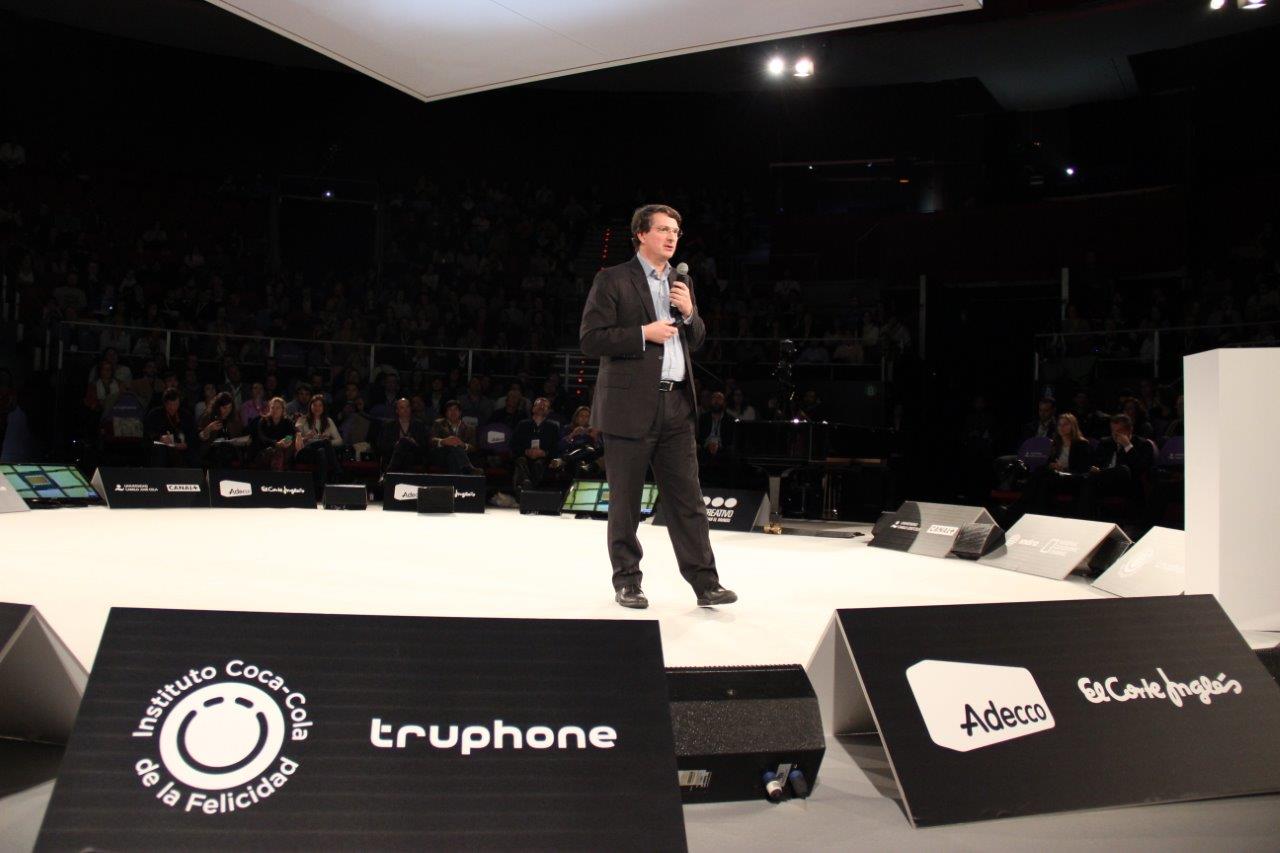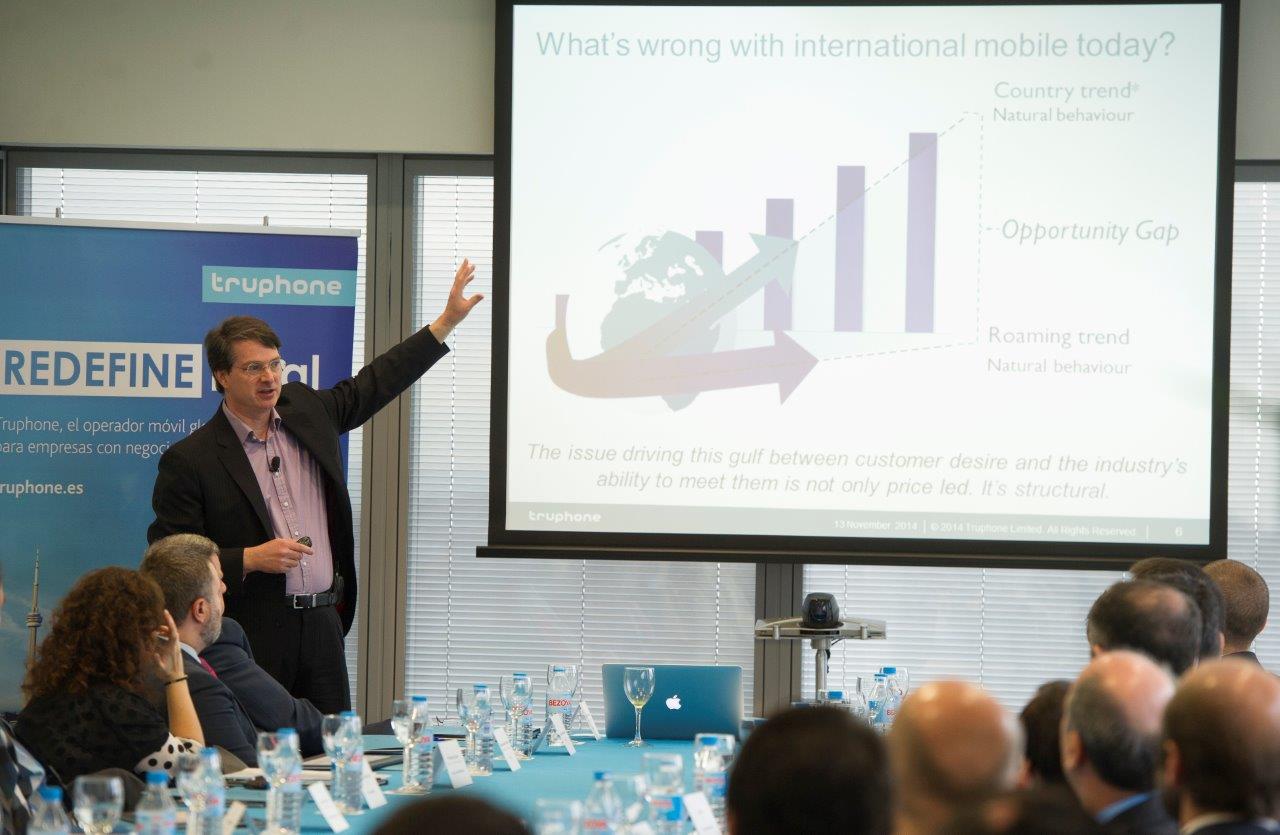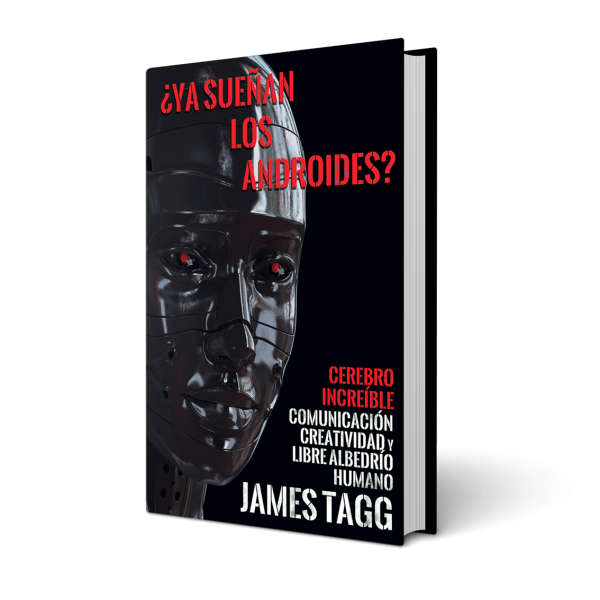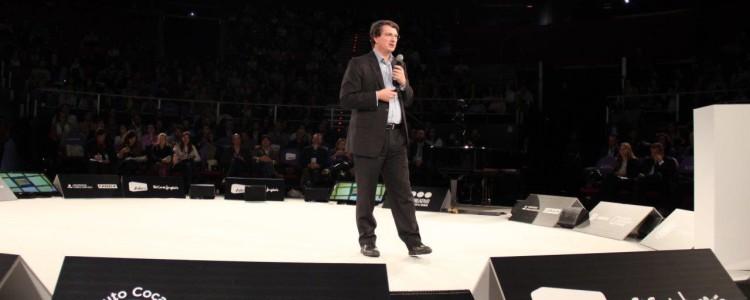Patricia Hayter interviewed me for the Truphone blog about speaking at TADSummit and Brilliant Minds.
Patricia Hayter :
James, you were recently on the road in Istanbul at TADSummit and also in Madrid speaking at the sensational Brilliant Minds event. Please tell us firstly, how was Brilliant Minds?
James Tagg :
Well it was quite scary because it is a presentation in the round. The venue was originally built for boxing matches. The ring’s been replaced, there are no ropes anymore, just TV screens. You speak without notes for 21 minutes exactly, there’s a little timer on your presentation that counts down and when 6 minutes or so are left, you are tempted to panic!
The line-up of speakers was very interesting. The doctor who invented the Pacemaker, the scientist from NASA responsible for stopping asteroids hitting the Earth, and the artist who took the Tiananmen Square shot of the lone Chinese citizen facing a line of tanks. It was special to be invited to join the same line-up as these famous people. I had a full time minder for the duration, and even my own dressing room, which made me feel like a star.

I chose to talk about my personal experience of inventing, and the science around invention and creativity. I covered growing up inventing fun things as a child and then some of the things I have been involved in as an adult such as the invention of the touch screen and of course, Truphone’s technology.
If you look at the history of inventing we didn’t really understand creativity and invention until the Renaissance but since then innovation has accelerated so that it is a major driver of commerce today. Now that computers are getting so powerful, one of the most interesting questions for me is: can computers be creative and invent too?
It’s a topical question – this question of the power of machines – because of the interest in Alan Turing. The recent film, The Imitation Game, tells the story of Alan Turing and his efforts to break the Enigma Code during WWII, but we should remember this is not his greatest achievement. He invented the modern computer; or, at the very least, the modern discipline of computer science. Turing provided us with all the original scientific underpinning describing what computers can and cannot do. One of the things he proved when he was only 22 years of age, was that computers could not automatically discover new mathematical theorems. But of course, mathematicians do this all the time. So if a computer cannot discover a theorem but a human can, does that make us fundamentally different?
This is one of the world’s great modern questions. We do not understand how the human brain works or what consciousness is, we do not know whether we are computers, and we don’t know where the boundaries of computers lie. Will computers overtake us intellectually or are there things they cannot do? At Brilliant Minds, I put forward my theory that humans have a fundamentally different approach to thinking.
Hayter
You launched your book, ‘Are the Androids Dreaming Yet?’ – in Spanish, in Spain. What was that like?
Tagg
The conference I was speaking at was predominantly Spanish-speaking and I felt it was polite to do so. It was an interesting exercise to use the internet to find all the necessary skills from all around the world to launch a book in a language that I didn’t speak! The English one is on the way shortly.

The book is about the three big questions: How do humans communicate with each other – body language, humour, and all the things that make us human beings? Why and how are we creative? Can we be sure that computers are not going to be creative? In the book I give examples of computers that have been designed to be creative like AARON, Emily Howell and JAPE – art, music and jokes respectively. They’re quite impressive but they definitely have limitations. Having tackled those questions I look at the issue of free will, since our first creative task is to choose what to be creative about.
If there is no free will, and we are not choosing what we do, how can that be creativity? I don’t believe everything is pre-determined and our feeling of freedom is an illusion, I believe we create our own lives.
Hayter
Sounds like this might be quite a heavy book?
Tagg
Well I hope I have tackled these questions in an accessible way that anyone could read but I don’t gloss over the science. I want readers to properly understand why the world of information and invention is the way it is.
Hayter
During your time in Madrid you met with some other people at the UK Embassy. What did you discuss there?
Tagg
The day before Brilliant Minds we invited about 40 people – a mixture of CIOs and journalists to a breakfast with Forrester. Forrester discussed a new report on the degree of mobilisation that work forces had achieved, broken down by country. Spain ranked one of the highest meaning that they use mobile phones and tablets rather than computers for their transactions than nearly any other country in the world – booking a flight, checking into a hotel, writing emails, and even buying books on Amazon!

I went on to discuss what is driving companies to use mobile technology. I believe businesses are super-specializing, meaning we reach out across the world in real time – to answer questions, to learn, to get work done, to speak to experts, and so on. This trend really started when Academia launched the internet on the rest of us. Academics and medics had been collaborating for decades using proprietary networks before the technology broke out of CERN – with the invention of the World Wide Web – and entered the wider business community.
Now of course we all expect to interact globally from wherever we are. I explained to the audience that this included me honing my presentation using my laptop perched on the seat of a taxi, while the marketing and graphics people back at home edited the presentation in real time. My presentation was a lot better for having those last-minute touches made, making it more relevant and immediate. You might wonder if I would be better preparing further upfront but this would lack the ability to respond to events and the current situation. If you aren’t working and fine-tuning your presentation and proposal right up to the deadline and your competitor is, they will have something better than you.
I explained how the Truphone network is designed to optimise your experience particularly when you’re travelling. But it is important to point out it is just as good when you’re at home and want to collaborate. Our unique network architecture is built with an internet philosophy. Data and voice are kept local wherever possible and only authentication is routed to home servers. This means web pages and applications work faster and calls have low latency. We also have a flat tariff across 66 countries which means you don’t have to worry about roaming – you can work the same as if you were at home.
Many of our customers are attracted by the cost proposition; however the gains in productivity are often the greatest improvement to their businesses. Customers regularly see data and voice usage double, while at the same time costs go down by around a third. The CIOs and journalists seemed to understand this point.
Hayter
So we can get your book online?
Tagg
The book is available in Spanish, right now on Amazon Spain. The English version will be available soon.
Hayter
Muchas gracias, James Tagg.


